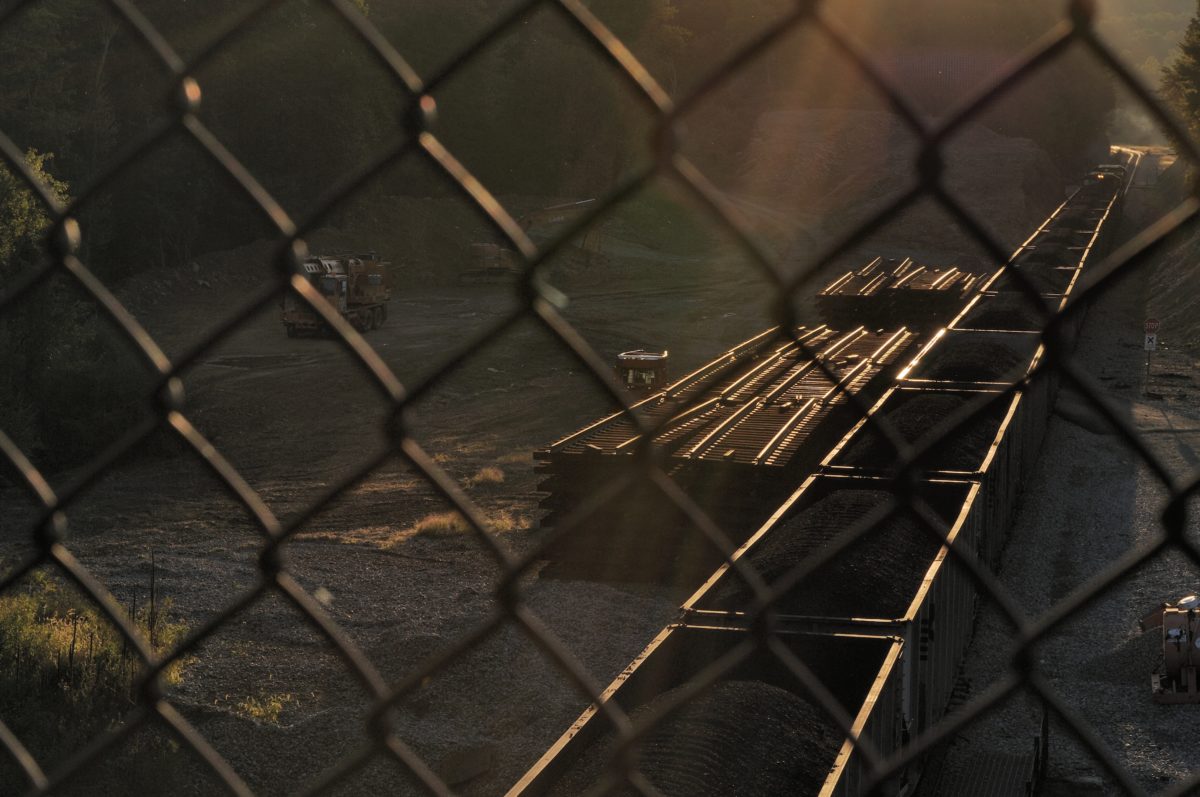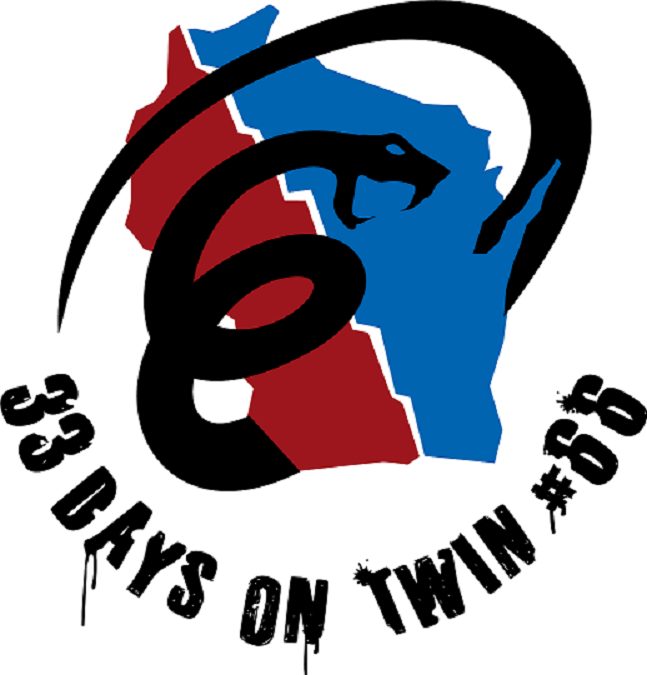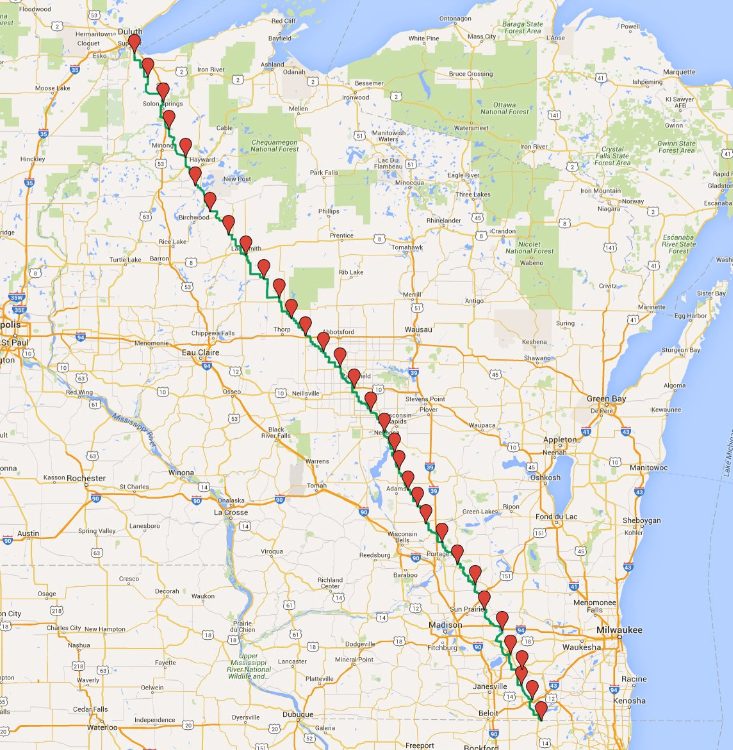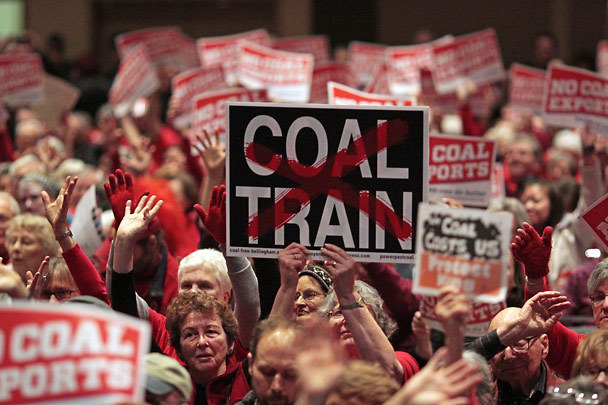
by Deep Green Resistance News Service | Feb 3, 2017 | Lobbying
by Community Environmental Legal Defense Fund
Today, Spokane activists, including several who were arrested for blocking fossil fuel trains in Spokane four months ago, filed suit against the federal government in the United States District Court for the Eastern District of Washington.
The lawsuit, known as Holmquist et. al. v. United States, asserts that the federal law preempting city health and safety laws over fossil fuel rail shipments violates residents’ constitutional right to a healthy climate and local self-government.
This is a first-of-its-kind case directly challenging federal preemption as an infringement of constitutional rights when that preemption operates to prohibit the passage of health and safety laws at the municipal level.
The lawsuit comes on the heels of a recent federal court decision in Oregon which recognized that people possess a fundamental constitutional “right to a liveable climate” pursuant to the due process clause of the United States Constitution.
In that case, Kelsey Cascadia Rose Juliana v. United States, Civ. No. 6:15-cv-01517 (November 10, 2016), Judge Ann Aiken of the U.S. District Court for the District of Oregon wrote, “I have no doubt that the right to a climate system capable of sustaining human life is fundamental to a free and ordered society. . . to hold otherwise would be to say that the Constitution affords no protection against a government’s knowing decision to poison the air its citizens breathe or the water its citizens drink.”
Plaintiffs in the Spokane lawsuit include Dr. Gunnar Holmquist, the primary sponsor of a City of Spokane citizen-sponsored initiative to ban coal and oil trains due to climate change. Additional plaintiffs are Rusty Nelson, Nancy Nelson, Margie Heller, Deena Romoff, George Taylor, and G. Maeve Aeolus, each of whom was arrested in August and September 2016 actions for blocking fossil fuel trains. The plaintiffs are being represented by Lindsey Schromen-Wawrin, a lawyer with the Community Environmental Legal Defense Fund.
Dr. Holmquist, the lead plaintiff in the litigation, declared, “Now is the time to step forward to do everything possible to stem the global crisis of climate change. This lawsuit will inevitably be the first of many which seek to begin to align state and federal laws with the realities of global warming – liberating communities to begin to take the difficult steps necessary for our continued survival on this planet.”
The federal lawsuit coincides with the re-filing of an initiative within the City of Spokane to amend the City’s home rule charter. The initiative would recognize a “right to a healthy climate” and ban fossil fuel trains as a violation of that right. Supporters of that initiative are preparing to collect signatures to qualify the initiative for the November 2017 ballot.
About CELDF — Community Environmental Legal Defense Fund
The Community Environmental Legal Defense Fund is a non-profit, public interest law firm providing free and affordable legal services to communities facing threats to their local environment, local agriculture, local economy, and quality of life. Its mission is to build sustainable communities by assisting people to assert their right to local self-government and the rights of nature.
Featured image: Steve Tatum, Flickr Creative Commons – Coal Train. View from the footbridge on the Huckleberry Trail crossing the Norfolk Southern tracks.

by Deep Green Resistance News Service | May 22, 2016 | ACTION, Protests & Symbolic Acts
By Sacred Water Sacred Land
Sacred Water Sacred Land is sponsoring a tar sands awareness walk through Wisconsin along Enbridge’s proposed Twin Line #66 starting with a kick-off event in Delevan or Walworth on June 8th.
33 Days on Twin #66, a Sacred Water Sacred Land sponsored walk, begins at the entry point of the Enbridge pipeline system, just south of Walworth, WI and follows the route northwest to Superior, raising awareness about the existence of, and proposed expansion to, the Enbridge crude and dilbit pipeline corridor along the way.
33 Days on Twin#66 will consist of consecutive daily 10-15 mile segments with community engagement talks in a revival type setting at overnight encampments at many points along the way. The 420-mile pipeline route is broken into four major sections: northern, upper central, lower central and lower.
Winona La Duke, who has fought tirelessly against the Sandpiper expansion in Minnesota, and her sister Lorna, will be riding with us on horseback along several sections of the walk.
Affected communities and landowners will be engaged by representatives of SWSL – Sacred Water Sacred Land, CELDF – Community Environmental Defense Fund, and WiSE – Wisconsin Safe Energy Alliance, through an ecological forum where the impact of the expansion and a broader conversation about the adverse effects of Canadian tar sands extraction and transport will be explained. Guest speakers will also address climate change and traditional ties to the land while local residents will be encouraged to share their stories and efforts towards healing it.
Through this effort, SWSL endeavors to not only draw attention to the tremendous hazards of tar sands/Bakken oil transport but also help communities imagine and co-create a more sustainable, health conscious society with an emphasis on renewables and non-toxic food systems.
We are looking for additional sponsors to lend credence and build support for the Walk. Sponsorship is welcome in many forms. We encourage you to share the Walk with your membership and follow us on Facebook where specific details will be posted as they solidify. If you wish to participate in greater measure, please contact SWSL directly.
It is past time to unify our efforts and promulgate ecological systems literacy. We hope you will join us as we work together towards a paradigm shift of social and environmental justice for the natural world and the next seven generations.
Cosponsored by WiSE, CELDF, and SWSL

Schedule:
1 ~ June 8th – Walworth*, Kick-off!
2 ~ June 9th – Delavan*
3 ~ June 10th – Richmond
4 ~ June 11th – Whitewater*
5 ~ June 12th – Fort Atkinson*
6 ~ June 13th – Lake Mills*
7 ~ June 14th – Sun Prairie*
8 ~ June 15th – Columbus*
9 ~ June 16th – Wyocena
10 ~ June 17th -Portage*
11 ~ June 18th – Oxford*
12 ~ June 19th -Westfield
13 ~ June 2oth – Adams/Friendship*
14 ~ June 21st – Cottonville
15~ June 22nd – Lake Arrowhead
16 ~ June 23rd – Nekoosa*
17 ~ June 24th – Vesper
18 ~ June 25th – Marshfield*
19 ~ June 26th – Spencer
20 ~ June 27th – Riplinger
21 ~ June 28th – Owen/Withee*
22 ~ June 29th – Lublin
23 ~ July 30th – Gilman
24 ~ July 1st – Sheldon
25 ~ July 2nd – Ladysmith*
26 ~ July 3rd – Imalone
27 ~ July 4th – Meteor
28 ~ July 5th – Hauer-Stone Lake
29 ~ July 6th – Hayward
30 ~ July 7th – Gordon*
31 ~ July 8th – Salon Springs
32 ~ July 9th – Hillcrest
33 ~ July 10th – Superior*, Renewable Energy Independence Day!
* Denotes Revival
by Deep Green Resistance News Service | May 9, 2016 | Direct Action
New Law Shields People from Arrest for Protesting Project
By Community Environmental Legal Defense Fund
Grant Township, Indiana County, PA: Grant Township Supervisors passed a first-in-the-nation law that legalizes direct action to stop frack wastewater injection wells within the Township. Pennsylvania General Energy Company (PGE) has sued the Township to overturn a local democratically-enacted law that prohibits injection wells.
If a court does not uphold the people’s right to stop corporate activities threatening the well-being of the community, the ordinance codifies that, “any natural person may then enforce the rights and prohibitions of the charter through direct action.” Further, the ordinance states that any nonviolent direct action to enforce their Charter is protected, “prohibit[ing] any private or public actor from bringing criminal charges or filing any civil or other criminal action against those participating in nonviolent direct action.”
Grant Township Supervisor Stacy Long explained, “We’re tired of being told by corporations and our so-called environmental regulatory agencies that we can’t stop this injection well! This isn’t a game. We’re being threatened by a corporation with a history of permit violations, and that corporation wants to dump toxic frack wastewater into our Township.”
Long continued, “I live here, and I was also elected to protect the health and safety of this Township. I will do whatever it takes to provide our residents with the tools and protections they need to nonviolently resist aggressions like those being proposed by PGE.”
In 2013, residents in Grant Township learned that PGE was applying for permits that would legalize the injection well. Despite hearings, public comments, and permit appeals demonstrating the residents’ opposition to the project, the federal Environmental Protection Agency issued a permit to PGE.
Finding themselves with no other options, residents requested the help of the Community Environmental Legal Defense Fund (CELDF). Grant Township Supervisors, with broad community support, passed a CELDF-drafted Community Bill of Rights ordinance in June 2014. The ordinance established rights to clean air and water, the right to local community self-government, and the rights of nature. The proposed injection well is prohibited as a violation of those rights.
PGE promptly sued the Township, claiming that it had a “right” to inject within the Township.
The case is ongoing. Last year, in October 2015, the judge invalidated parts of the ordinance, stating that the Township lacked authority to ban injection wells. Three weeks later, in November 2015, residents voted in a new Home Rule Charter. The rights-based Charter reinstated the ban on injection wells by a 2-to-1 vote, overriding the judge’s decision.
CELDF assisted the community with the drafting of the Charter and is representing the Township in the ongoing litigation with PGE.
Grant Township Supervisor and Chairman Jon Perry summed up the situation by saying, “Sides need to be picked. Should a polluting corporation have the right to inject toxic waste, or should a community have the right to protect itself?”
Perry continued, “I was elected to serve this community, and to protect the rights in our Charter voted in by the people I represent. If we have to physically and nonviolently stop the trucks from coming in because the courts fail us, we will do so. And we invite others to stand with us.”
Those others are showing up. Tim DeChristopher, co-founder of the Climate Disobedience Center, stated, “I’m encouraged to see an entire community and its elected officials asserting their rights to defend their community from the assaults of the fossil fuel industry, and I know there are plenty of folks in the climate movement ready to stand with Grant Township.”
CELDF community organizer Chad Nicholson has been working with the community since 2014. He added, “In our country’s history, we celebrate people standing up to challenge unjust laws. The American Revolution, abolition, women’s suffrage, the labor and civil rights movements, marriage equality – all required people to take action resisting illegitimate laws. All required creating new and more just laws in their place. We applaud the people of Grant Township for taking action as their community is threatened, and asserting their rights. It is an honor to stand with them.”
If you are interested in supporting the efforts in Grant Township, please contact Stacy Long, lemonphone28@gmail.com or 724.840.7214.

by Deep Green Resistance News Service | Jul 28, 2015 | Climate Change, Lobbying, Strategy & Analysis
By Thomas Linzey / CELDF
Four years ago, as we were leaving Spokane to help rural Pennsylvania communities stop frack injection wells and gas pipelines, this region’s environmental groups couldn’t stop talking about “stopping the coal trains.”
After people in British Columbia – including NASA’s top climate scientist James Hansen – were arrested for blocking oil trains; and after people in Columbia County, Oregon have now proposed a countywide ban on new fossil fuel trains, one would think that both the Spokane City Council and the region’s environmental groups would have begun to take strong steps here to, well, actually stop the coal trains.
After all, there is now almost universal agreement that the continued use of fossil fuels threatens almost every aspect of our lives – from scorching the climate to acidifying the oceans and fomenting widespread droughts.
But it seems that both the Council and this region’s environmental groups have resigned themselves to being silent accomplices to this slow-moving disaster.
A few weeks ago, at a forum on coal and oil trains, rather than propose a citywide ban on oil and coal trains, those groups instead focused on the dangers of train derailments and coal dust – two real issues to be sure – but ones that fall completely short of recognizing the underlying problems posed by the trains.
If the problem is derailments and dust, then the solution is to reinforce and cover the railroad cars. That may or may not happen, but even if it does, it doesn’t solve the fundamental problem posed by the coal and oil trains. Instead, such a stance broadcasts the message from the City of Spokane and this region’s environmental groups that the coal and oil trains are okay as long as they are “safe.”
The real problem, of course, is that the fossil fuels that the oil and coal trains carry – when used the way they are intended to be used – can never be made “safe” because their guaranteed combustion is slowly boiling the very planet on which we live.
At the end of Spokane City Council President Ben Stuckart’s presentation at the forum last week, he spoke about his dead-end meetings with state and federal officials, whose doors were open to the energy and railroad corporations but not to communities affected by the trains. Stuckart declared that he wasn’t sure that anything short of laying down on the tracks would stop the coal and oil trains.
For one brief shining moment, it seemed that the heavens had parted and what we’re really up against – a governmental system controlled by the very corporations it is ostensibly supposed to regulate – came shining through.
As I watched, people across the room began to shout and applaud; and then, just as quickly as it had come, it passed, as the hosts of the forum steered everyone back to their latest moving target – this time, urging people to write letters begging Governor Inslee to stop proposed oil and gas exports. In other words, now nicely asking the Governor to stop more oil and coal trains from invading Spokane.
I then realized why I stopped going to those gatherings – I stopped because the form of activism proposed by the groups actually strips us of the belief that we’re capable of doing anything by ourselves, as a community, to actually stop the trains. Writing letters reinforces a hopelessness of sorts – that we’re completely dependent on the decision by others to “save” us, and that we’re incapable of taking action to save ourselves.
It would be akin to the civil rights movement writing letters to congress instead of occupying the lunch counter or the seats at the front of the bus. Or Sam Adams sending a letter to King George urging him to put safety bumpers on the ships carrying tea, rather than having a tea party by dumping casks of tea in the harbor.
Until we confront the energy and railroad corporations directly, they will continue to treat Spokane as a cheap hotel. We need to ban and stop the trains now – using everything that we can – before future generations wonder why we spent so much time sending letters and so little time protecting them.
Thomas Alan Linzey, Esq., is the Executive Director of the Community Environmental Legal Defense Fund and a resident of the City of Spokane. The Legal Defense Fund has assisted over two hundred communities across the country, including the City of Pittsburgh, to adopt local laws stopping corporate factory farms, waste dumping, corporate water withdrawals, fracking, and gas pipelines. He is a cum laude graduate of Widener Law School and a three-time recipient of the law school’s public interest law award. He has been a finalist for the Ford Foundation’s Leadership for a Changing World Award, and is a recipient of the Pennsylvania Farmers Union’s Golden Triangle Legislative Award. He is admitted to practice in the United States Supreme Court, the Third, Fourth, Eighth, and Tenth Circuit Courts of Appeals, the U.S. District Court for the Western and Middle Districts of Pennsylvania, and the Commonwealth of Pennsylvania. Linzey was featured in Leonardo DiCaprio’s film 11th Hour, assisted the Ecuadorian constitutional assembly in 2008 to adopt the world’s first constitution recognizing the independently enforceable rights of ecosystems, and is a frequent lecturer at conferences across the country. His work has been featured in the New York Times, the Los Angeles Times, Mother Jones, the Nation magazine, and he was named, in 2007, as one of Forbes’ magazines’ “Top Ten Revolutionaries.” He can be reached at tal@pa.net.
by Deep Green Resistance News Service | Apr 29, 2013 | Lobbying, Mining & Drilling
By Community Environmental Legal Defense Fund
Earlier today, the County Commission of Mora County, located in Northeastern New Mexico, became the first county in the United States to pass an ordinance banning all oil and gas extraction.
Drafted with assistance from the Community Environmental Legal Defense Fund (CELDF), the Mora County Community Water Rights and Local Self-Government Ordinance establishes a local Bill of Rights – including a right to clean air and water, a right to a healthy environment, and the rights of nature – while prohibiting activities which would interfere with those rights, including oil drilling and hydraulic fracturing or “fracking,” for shale gas.
Communities across the country are facing drilling and fracking. Fracking brings significant environmental impacts including the production of millions of gallons of toxic wastewater, which can affect drinking water and waterways. Studies have also found that fracking is a major global warming contributor, and have linked the underground disposal of frack wastewater to earthquakes.
CELDF Executive Director Thomas Linzey, Esq., explained, “Existing state and federal oil and gas laws force fracking and other extraction activities into communities, overriding concerns of residents. Today’s vote in Mora County is a clear rejection of this structure of law which elevates corporate rights over community rights, which protects industry over people and the natural environment.”
He stated further that, “This vote is a clear expression of the rights guaranteed in the New Mexico Constitution which declares that all governing authority is derived from the people. With this vote, Mora is joining a growing people’s movement for community and nature’s rights.”
CELDF Community Organizer and Mora County resident, Kathleen Dudley, added, “The vote of Mora Commission Chair John Olivas and Vice-Chair Alfonso Griego to ban drilling and fracking is not only commendable, it is a statement of leadership that sets the bar for communities across the State of New Mexico.” She explained that the ordinance calls for an amendment to the New Mexico Constitution that “elevates community rights above corporate property rights.”
Mora County joins Las Vegas, NM, which in 2012 passed an ordinance, with assistance from CELDF, which prohibits fracking and establishes rights for the community and the natural environment. CELDF assisted the City of Pittsburgh, PA, to draft the first local Bill of Rights which prohibits fracking in 2010. Communities in Pennsylvania, Ohio, Maryland, New York, and New Mexico have enacted similar ordinances.
Mora County joins over 150 communities across the country which have asserted their right to local self-governance through the adoption of local laws that seek to control corporate activities within their municipality.
From CELDF:




